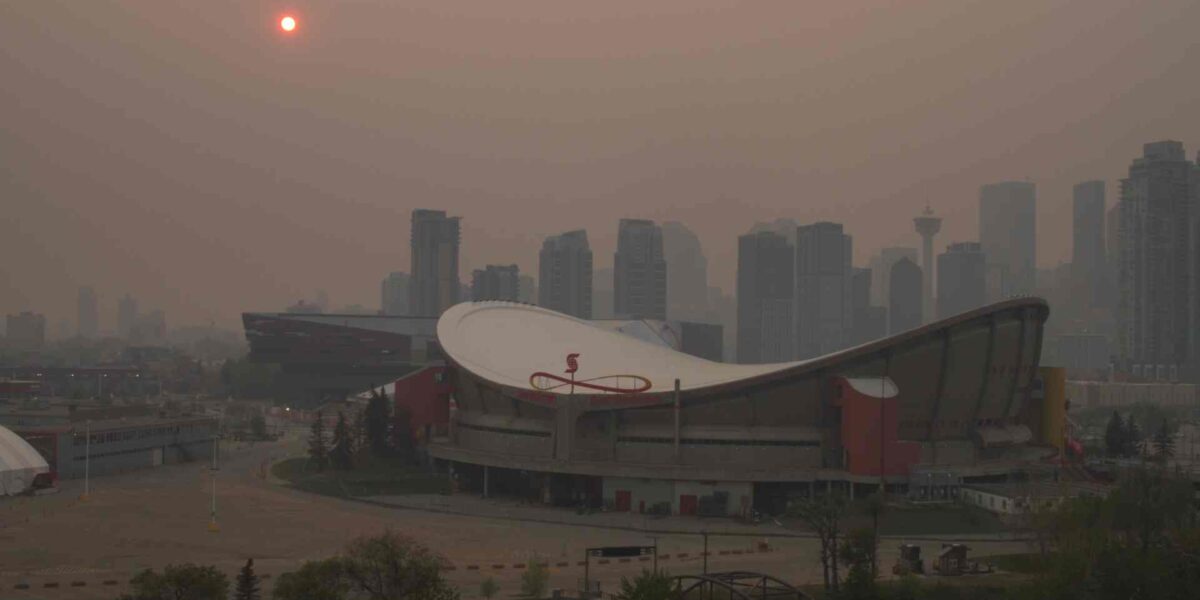Picturesque snow-covered mountains have long painted an image of Alberta in the winter. This year, that image has been replaced by wildfires – in February. Thanks to climate change, an unnaturally warm winter and a lack of precipitation in the province have ignited an early start to the wildfire season.
Across the country, Ottawa’s Rideau Canal Skateway is suffering to maintain its presence amidst increasingly warm winter temperatures. Ironically, these national symbols are being deteriorated by overbearing efforts to maintain another facet of the country’s national identity – Canada as a fossil fuel state.
Home to the world’s third-largest oil reserves, Alberta’s oil sands have repeatedly been labelled as ‘national treasures’ by industry actors and government officials. Imageries of wild, uninhabited, and natural spaces are deeply rooted within the Canadian identity and support the continued practice of settler land domination. From forestry to fossil fuels, resource extraction has been ingrained within the settler Canadian national identity and is responsible for shaping the physical and cultural landscape of the country we know today.
Yet, the urgency of the climate crisis requires that the country’s fossil fuel reserves remain underground. As the main driver behind anthropogenic climate change, the continuation of fossil fuel extraction ensures Canada’s failed commitment to the Paris Agreement.
Despite claims for climate action, in 2022 Canada was the fourth-largest producer of oil and the fifth-largest producer of natural gas in the world. To make matters worse, the federally owned Trans Mountain Pipeline (TMX) expansion project has recently reached 98 per cent of completion. Once completed, TMX will carry 590,000 barrels of crude oil per day on top of preexisting flows. Nearby, Coastal GasLink (CGL) continues to violently push forward the CGL pipeline through Wet’suwet’en territory, criminalizing Indigenous lands defenders along the way.
After decades of hiding incriminating evidence linking the fossil fuel industry to anthropogenic climate change, fossil fuel conglomerates continue to manipulate public perceptions. In this time of crisis, the industry remains entrenched in the Canadian identity by partnering with and providing funding to universities and community initiatives. These actions call into question the autonomy of these institutions, while also actively working to maintain the presence and capital gain of the industry that is largely responsible for the climate crisis.
The fossil fuel industry is putting its best foot forward to remain part of the country’s national identity. But climate change is forcing us to change. The comforts of the past and familiarity with the status quo are no longer.
Global average temperatures will warm well beyond 1.5°C without systemic change. The chance to ‘build back better’ called for by many amid the COVID-19 pandemic has not been erased. There is now an opportunity to reshape the Canadian identity. To build an identity that reflects the needs of everyday people, as opposed to the desires of industry elites.
Equitable solutions to rising food prices, a lack of affordable housing, an absence of livable wages and an end to Indigenous land grabbing and fossil fuel extraction point to just a few facets upon which the new Canadian identity can be built.
This isn’t a utopian dream. Altering current social, cultural, and political structures to equitably meet the needs of all Canadians isn’t radical, it’s democratic. Many movements today, such as The Red Deal, are already bringing forth feasible alternative solutions – we just need to enact them. Continually putting climate change on the back of the political agenda is not an option.
Monumental efforts have been made by the fossil fuel industry to depoliticize people on climate action. The government, influenced heavily by the industry most responsible for the climate crisis, is positioned as the only rational actor. In reality, this couldn’t be further from the truth. In fact, government inaction has led us to increasing global temperatures and a worsening crisis.
In times of crisis, people rely on and build up community-oriented solutions that put the needs of those most impacted first. In disasters, people find hope and joy in the community relations they build. Climate change is an ongoing disaster but also an opportunity to build resilient communities. It is an opportunity to change a facet of the Canadian identity from one of extractivism and colonialism to one of equity.
A country increasingly burning, flooding, and suffering is terrifying, but it’s the reality. So, will Canadians say goodbye to snow and hello to wildfires – or will there be systemic change to avoid this catastrophe?



